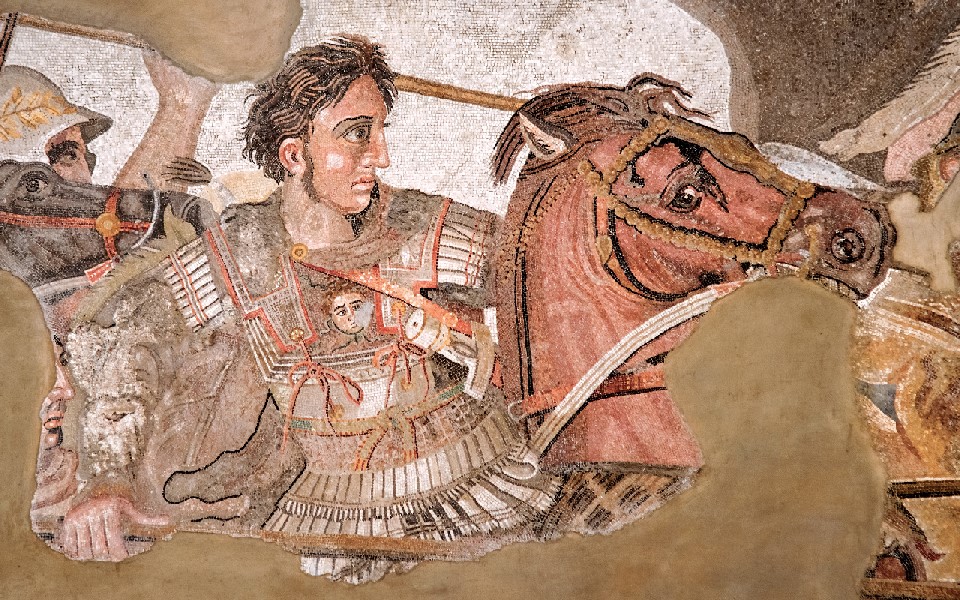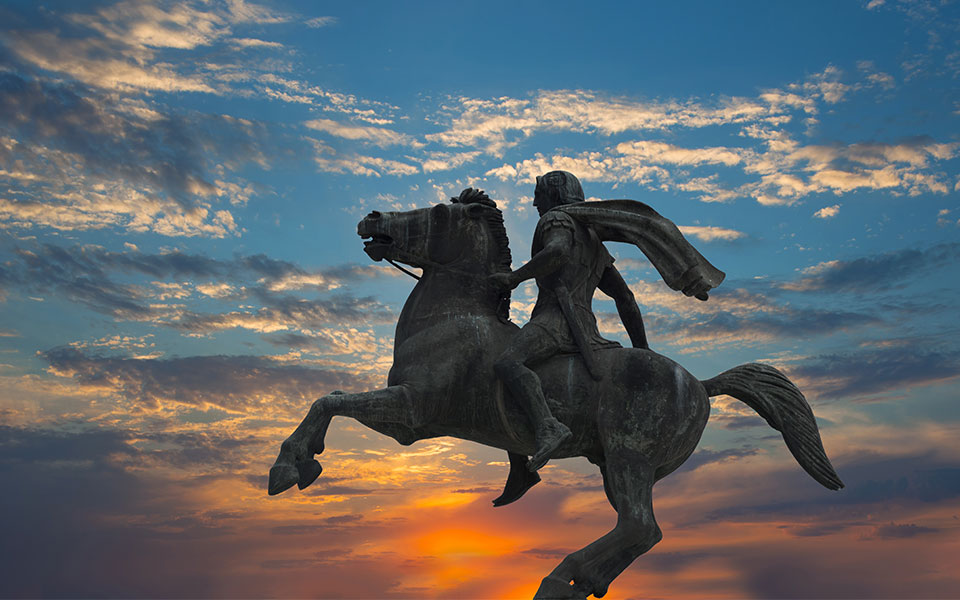The recent dramatized documentary series on Netflix, “Alexander: The Making of a God,” stirred up a storm of reactions, with Greece’s Minister of Culture, Lina Mendoni, characterizing it “fiction of extremely poor quality, lowly content, and full of historical inaccuracies.”
Kathimerini contacted Emeritus Professor of Greek Culture at the University of Cambridge, Paul Cartledge, author of the book “Alexander the Great: The Truth Behind the Myth” (2004), and asked him about the validity of the suggestions about the life of the famous Macedonian general, such as the Alexander-Hephaestion “relationship” and whether, ultimately, the Greek Ministry of Culture should take action against those who exploit Greek history for their own ends.
– Professor Cartledge, based on your extensive historical knowledge, what is your opinion on the recent Netflix docudrama?
My reaction is mixed. Alexander is actually a much more difficult, more complex, and much less accessible subject than the average viewer would assume; for two reasons:
a) We do not have diaries or other deeply personal, psychosocial elements about him, so we can never know what truly motivated him.
b) His career, his achievements were so exceptional, almost superhuman, that it is very difficult for us ordinary mortals to comprehend the true measure of the man. Netflix did very well to name the series “The Making of a God” because Alexander was indeed worshipped as a god during his lifetime by some of his fellow Greeks, as well as by non-Greeks.
– A large part of the criticism of the series focused on the presentation of Hephaestion as the sexual partner of Alexander. What do the ancient texts say about the love life of Alexander the Great, who is known to have fathered two children?
It’s complicated. During his lifetime, Alexander only sired one child – with a woman who was half-Greek, half-Iranian – whom they named “Heracles.” There was no marriage there, so there was no dynastic heir to the Macedonian throne. His first wife, Roxana – a Sogdian-Iranian woman – was pregnant with their first child when Alexander died [the future Alexander IV]. Therefore, Alexander was not exclusively homosexual.
Almost all ancient Greek men, especially kings, married women, but some were exclusively homosexual – one such character, Pausanias of Athens, features in Plato’s “Symposium.” In Thebes, between 378 and 338 BCE, an entire infantry battalion, the Sacred Band, consisted of 150 adult male couples. But the norm, for at least some upper-class men, was a premarital homoerotic phase – first as the “junior beloved,” then as the “senior,” adult partner.
Alexander was raised alongside his contemporary Hephaestion in Pella and educated with him by the great philosopher, Aristotle. It’s possible – and I emphasize “possible” – that they had a homoerotic, homosexual relationship, at least in their late adolescence and possibly later – remember that Alexander became king of Macedonia when he was only 20 years old. I emphasize the “possible” because no ancient source explicitly states that they were lover or beloved.
On the other hand, it is said that Alexander did indeed have a homosexual relationship, something more than an affair, with a Persian eunuch named Bagoas. For me, this means that as an adult – he was about 30 years old at the time – Alexander was not exclusively heterosexual. However, by then he had acquired not one but three wives, simultaneously: Roxana and two Persian princesses. So, he never married a Greek! Scandalous! All three of his wives were Iranians, and the one son he sired in his lifetime was with a half-Iranian woman. Interesting! Much more interesting, anyway, than the anachronistic issue of whether or not he was gay.

© Frankie Fouganthin / Public domain

– The cause of Alexander the Great’s death remains uncertain to this day. In your opinion, did he die from poisoning or from an illness? And if you lean towards the latter, for what reason did it pass into history that he was probably murdered?
Personally, I lean towards the opinion that his death was due to an illness that compounded with the years of serious injuries, the illnesses that struck him, excessive alcohol consumption, and the lack of adequate medical knowledge, skills, and drugs. Conspiracy theories were popular in the ancient world – as they are today – and given that the civil war broke out more or less immediately after his death, it was easy to conclude that Alexander’s death had been hastened “artificially” for the benefit of one or the other of the contenders for his inheritance, his ultimate – individual – autocratic power. But if he was indeed murdered, then it would have been by poisoning – many monarchs in the ancient world, from the Persians to the Roman emperors, were killed in this way.
– The Netflix documentary refers to the location of the tomb of Alexander the Great as one of antiquity’s greatest mysteries. Recently, historian Helene Glykatzi-Ahrweiler stated that his tomb is likely located in the area of Vergina. In your opinion, where is the final resting place of the great strategist?
Helene Glykatzi-Ahrweiler is a historian of Byzantium, not of Classical Greece. Alexander the Great was first buried in Babylon, embalmed/mummified, and then exhumed in 321 BC to transfer the body back to the Macedonian royal cemetery at Aigai (modern-day Vergina). However, the royal caravan was intercepted by Ptolemy, a childhood friend of Alexander. As a satrap, Ptolemy had Alexander’s body buried first in the old pre-Persian Egyptian capital, Memphis. At some point, when Alexandria was built and Ptolemy constructed a palace there, I suspect that the body was reburied, this time permanently, in a grand mausoleum resembling the style of “Lenin’s Tomb.” But what happened to that tomb and exactly where it was located, one can only guess. My guess is that, since the royal district of Alexandria is now underwater, the same applies to whatever – if anything – remains of Alexander’s tomb and his body.

© Shutterstock
– From the depiction of a “black” Cleopatra on Netflix to the “low-quality fiction” of Alexander, in your opinion, should the Greek Ministry of Culture protest and protect its cultural product?
The Greek Ministry of Culture has as much or as little right to protest about Netflix’s Alexander as the Iranian regime had, and indeed protested, about Zack Snyder’s 2006 movie “300,” depicting the Battle of Thermopylae. A movie is, of course, a movie, not actual history, even if it purportedly draws from historical events. Netflix’s documentary “Alexander” is much more a dramatization than a documentary, so it’s made for entertainment rather than education.
As for the “low-quality” Alexander, I suspect that no actor of our era could convincingly portray the “real” Alexander – who rightfully earned the title “Great,” albeit long after his death. There were several other Macedonian kings named Alexander, but only one was called “the Great.” Alexander did some very bad, indeed terrible things – both to individuals, such as Cleitus the Black and the eunuch Batis, governor of Gaza, and to collective groups, such as the Thebans in 335 BC and the Mallians (a tribe from the southern Punjab) in 326 BC, but without any doubt, he was not just great but the Great.
This article was previously published in Greek at kathimerini.gr.












